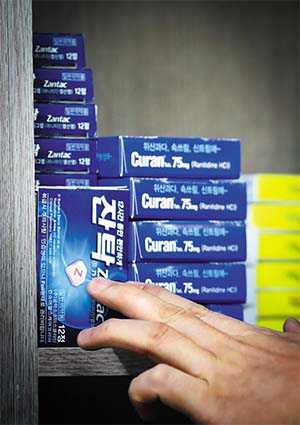Stomach Remedies Banned Over Cancer Scare
28 September, 2019

Health authorities on Thursday banned the sale of 269 common stomach drugs containing the antihistamine ranitidine.
The Food and Drug Safety Ministry said analysis of seven imported and domestic ranitidine medicines revealed that they contained excessive levels of the carcinogen N-Nitrosodimethylamine (NDMA).
That prompted the ministry to halt the import, production and sale of all brand-name and generic drugs containing ranitidine. An estimated 1.44 million patients are given the common stomach-ulcer and heartburn medication in Korea.
Up to 2.78-53.5 ppm of NDMA was found in the drugs. NDMA is classified as a carcinogen by the World Health Organization and the permitted maximum is 0.16 ppm.
The alert was first raised here when the U.S. Food and Drug Administration said in a press release on Sept. 13, "Some ranitidine medicines, including some products commonly known as the brand-name drug Zantac, contain [NDMA] at low levels."
The ministry at that time tested Zantac and some other 35 generic drugs sold in Korea but found no NDMA in them.
But after criticism that it is doubtful whether drugs sold in Korea are safe when the same ones sold in the U.S. are not, the ministry conducted another investigation of all 269 ranitidine drugs available in Korea and found that they contain excessive NDMA.
Asked why the findings were different, an official at the ministry said, "NDMA is not a main constituent but a foreign substance, so its amount can vary according to production time and storage conditions even in the same drugs."
"The permitted level of NDMA is based on the assumption that a patient takes 600 mg of ranitidine, which is the daily maximum dosage, for the rest of their life, but most take it for less than six weeks a year," the official added, suggesting sporadic consumption is probably harmless.
Patients who have been prescribed the drugs can have them replaced with others at their hospitals, and those who bought them over the counter can have them exchanged or get a refund.
Kim Young-ok at the ministry said, "Around 180 medications can be used to replace ranitidine, and avoiding ranitidine need not mean ulcer treatments are less effective."
But the ministry is under fire for dragging its heels over the problem. NDMA was already the subject of controversy in the recall of valsartan high-blood-pressure treatment last year.
Then and now the ministry acted only after a foreign health agency cited potential dangers. But on Thursday it said Korea is the only country to conduct an industry-wide probe, which took time due to the large number of drugs containing ranitidine that are sold here.
Source:
